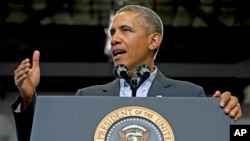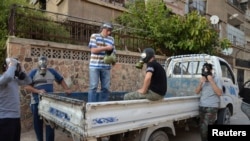WHITE HOUSE —
Russia and China are joining international calls for an investigation into an alleged poison gas attack in a suburb of Syria's capital, as U.S. President Barack Obama said the reported incident is of "grave concern."
Russia's foreign ministry Friday said claims by Syria's opposition that hundreds died in a poisonous gas attack this week should undergo an objective investigation and it called on Syria to cooperate.
Moscow also called on rebel forces to guarantee safe passage for United Nations investigators who are already in the country looking into previous allegations of chemical use. The ministry released the statement following a call between Russian Foreign Minister Sergei Lavrov and U.S. Secretary of State John Kerry.
China's foreign ministry Friday also backed calls for a U.N. investigation, with a spokesman telling the state-run Xinhua news agency that China "resolutely opposes" the use of chemical weapons no matter which side is responsible.
The United States has been pushing for a U.N.-led investigation. Obama told CNN that officials are still gathering information but called the reported attack a matter of "grave concern."
Obama also acknowledged many people around the world are looking to the U.S. to take action. But he said, "the notion that the U.S. can somehow solve what is a sectarian, complex problem inside of Syria sometimes is overstated."
President Barack Obama says Syria’s alleged use of chemical weapons against its own people has accelerated his process of deciding on a U.S. response. The president faces a narrow range of options.
In an interview Thursday with CNN, the president described the alleged use of chemical weapons by the Syrian government as a big event of grave concern.
“We are still gathering information about this particular event, but it is very troublesome," said President Obama.
Obama said the situation requires the attention of the United States and the international community.
But he said the U.S. needs to “think through” its response, warning that “jumping into stuff…does not turn out well.”
“We have to think through strategically what is going to be in our long-term national interest," said Obama.
Obama said he would seek international support before taking major action.
The president has been criticized for not acting more decisively after saying that Syria’s use of chemical weapons would cross a “red line.”
Obama recently pledged U.S. aid to Syrian opposition groups, but has not sent much assistance so far.
Leila Hilal, director of the Middle East Task Force at Washington’s New America Foundation, says backing the opposition could be helpful in fighting the government. But she says that would do nothing to stop the use of chemical weapons.
Hilal says another military option would be to launch missile strikes from outside Syria. She says that, too, carries risks.
“While you can hit chemical deposits and factories and storage units, the question is whether or not that would end up hurting more than helping, given the potential for civilian casualties," said Hilal.
Hilal says the best of the few options available may be to rekindle prospects for a political solution. She believes Syria’s supporters, such as Iran, could be helpful in moving the government toward negotiations.
“The Assad regime clearly sees an advantage in continuing to fight on the ground, and it is not thinking right now that there is an advantage to a political process. But that does not mean that the people supporting him do not think that there could be an advantage to a political process," she said.
Russia, which backs the Assad government, joined the United Nations Friday in urging Syria to grant access to U.N. inspectors.
The Syrian government denies that it has used chemical weapons.
Russia's foreign ministry Friday said claims by Syria's opposition that hundreds died in a poisonous gas attack this week should undergo an objective investigation and it called on Syria to cooperate.
Moscow also called on rebel forces to guarantee safe passage for United Nations investigators who are already in the country looking into previous allegations of chemical use. The ministry released the statement following a call between Russian Foreign Minister Sergei Lavrov and U.S. Secretary of State John Kerry.
China's foreign ministry Friday also backed calls for a U.N. investigation, with a spokesman telling the state-run Xinhua news agency that China "resolutely opposes" the use of chemical weapons no matter which side is responsible.
The United States has been pushing for a U.N.-led investigation. Obama told CNN that officials are still gathering information but called the reported attack a matter of "grave concern."
Obama also acknowledged many people around the world are looking to the U.S. to take action. But he said, "the notion that the U.S. can somehow solve what is a sectarian, complex problem inside of Syria sometimes is overstated."
President Barack Obama says Syria’s alleged use of chemical weapons against its own people has accelerated his process of deciding on a U.S. response. The president faces a narrow range of options.
In an interview Thursday with CNN, the president described the alleged use of chemical weapons by the Syrian government as a big event of grave concern.
“We are still gathering information about this particular event, but it is very troublesome," said President Obama.
Obama said the situation requires the attention of the United States and the international community.
But he said the U.S. needs to “think through” its response, warning that “jumping into stuff…does not turn out well.”
“We have to think through strategically what is going to be in our long-term national interest," said Obama.
Obama said he would seek international support before taking major action.
The president has been criticized for not acting more decisively after saying that Syria’s use of chemical weapons would cross a “red line.”
Obama recently pledged U.S. aid to Syrian opposition groups, but has not sent much assistance so far.
Leila Hilal, director of the Middle East Task Force at Washington’s New America Foundation, says backing the opposition could be helpful in fighting the government. But she says that would do nothing to stop the use of chemical weapons.
Hilal says another military option would be to launch missile strikes from outside Syria. She says that, too, carries risks.
“While you can hit chemical deposits and factories and storage units, the question is whether or not that would end up hurting more than helping, given the potential for civilian casualties," said Hilal.
Hilal says the best of the few options available may be to rekindle prospects for a political solution. She believes Syria’s supporters, such as Iran, could be helpful in moving the government toward negotiations.
“The Assad regime clearly sees an advantage in continuing to fight on the ground, and it is not thinking right now that there is an advantage to a political process. But that does not mean that the people supporting him do not think that there could be an advantage to a political process," she said.
Russia, which backs the Assad government, joined the United Nations Friday in urging Syria to grant access to U.N. inspectors.
The Syrian government denies that it has used chemical weapons.





